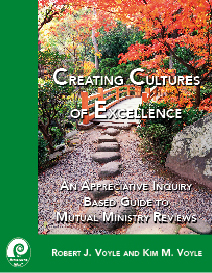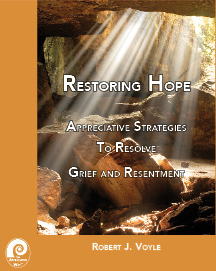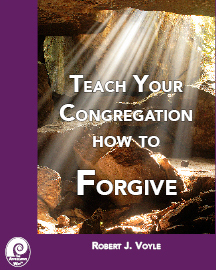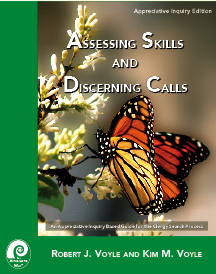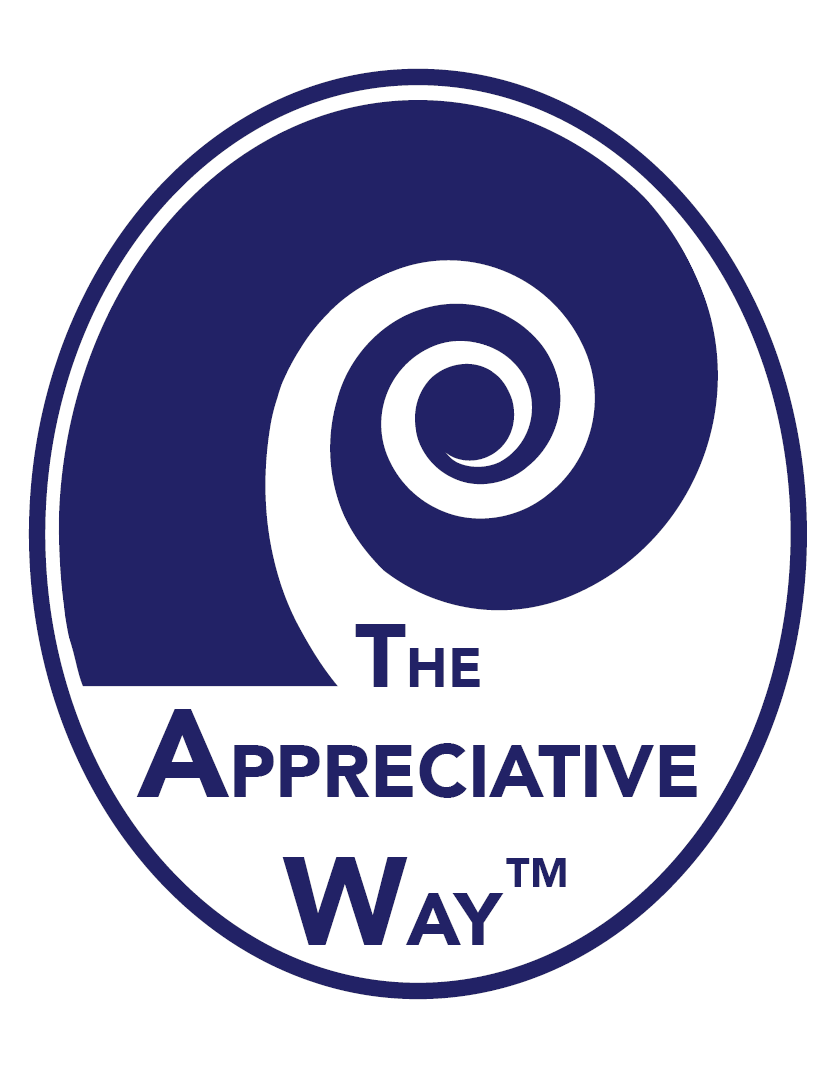

Rob Voyle's Appreciative Way Blog
Additional Articles By Year: 2016 | 2015 | 2014 | 2013 | 2012 | 2011 | 2010
The Importance of Understanding Your Purpose
Posted: September 6, 2010 by Rob Voyle
"You have to be really careful if you don't know where you are going because you might not get there." Yogi Bera
One of the critical things I have discovered since learning of appreciative inquiry is how important having a clear sense of purpose is both to healthy individuals and congregations. Our experience of dynamic congregations, that are growing both spiritually and where possible numerically, suggests that one of their common factors is that they all have a clear sense of purpose that is regularly articulated in all that they do.
Congregational life and vitality occurs at the cross roads of the church's purpose and the individual member's purpose. Congregational vitality occurs to the extent that the purpose of the church resonates with the purpose of the individuals and vice versa. Yet what we have discovered is that very few people can clearly state their personal purpose or their church's purpose. In their aimlessness they often become apathetic, passionless, or conflicted over trivialities.
In our coach training we teach people how to use the appreciative process to help both individuals and congregations to explore their best to discover their unique purpose for it is at our best that we most closely manifest the image of God that we were created to be. Our goal is to help people to create a purposeful life in which they can say Yes! to God, Yes! to their neighbor, and Yes! to themselves, for life can only be found in what we deeply affirm or say Yes! to.
Rob Voyle
Check the Training Schedule for the latest listing of leadership training programs.
Thinking about Lent, Sin, and Grace
Posted: August 6, 2010 by Rob Voyle
Many people at our appreciative inquiry training programs, because of its very positive approach, ask what is an appreciative inquiry understanding of sin. While we take sin seriously, we take growing in grace even more seriously and make that the focus of our attention. We don't try to reduce the presence of sin directly, for that leads to St. Paul's conundrum in Romans, where the harder he tries not to sin the worse it gets. What we focus on is grace and how we can grow in that, and discover like St. Paul that where grace abounds, sin cannot.
When Jesus healed the blind man he refused to entertain ideas about the origins of sin and whose sin caused the man to be blind. He focused instead on the grace of God that was to be manifested in the man's healing. The traditional focus during Lent has often been on reflecting on the commandments and how we have broken them, which just makes us experts on sin, which can be very demoralizing and not lead to a grace filled life. An appreciative approach would be to also reflect on the times that we have kept the commandments, what enabled us to keep the commandments, and how that has been a blessing in our lives and in the lives of our neighbors.
"Jesus didn't come that we might have less sin and death,
he came that we might have life,
and share it abundantly with our neighbors."
Rob Voyle
See Restoring Hope for healing and change strategies based in the Appreciative Way.
Ensuring Change is a Blessing
Posted: July 1, 2010 by Rob Voyle
Psychologist Stephen Gilligan, says that "People don't want to be changed they want to be blessed." One of the main reasons why people resist change is because they do not perceive the change will result in a blessing - an outcome state that is of greater value than they currently have. In many cases people resist change because they perceive the outcome to be of lesser value. The rich young ruler who asked Jesus what he needed to do to have eternal life could not perceive that following Jesus was more valuable than his current wealth. Even self-sacrifice is based on the belief that there is a greater reward to the person offering the sacrifice. To be sustainable, change must also be a blessing to all and not just some. Any blessing that comes to us at the unwilling expense of someone else is not a blessing it is theft and it will be resisted and will not be sustainable.
In the Appreciative Way we explore what people deeply value about themselves and their church to ensure that any proposed change will be a genuine blessing by adding value to their lives and their community as a whole.
Rob Voyle
Check the Training Schedule for the latest listing of coach training programs.
Thinking and Acting Like a Leader
Posted: June 1, 2010 by Rob Voyle
Can your average parishioner tell you in 30 seconds or less what the mission of your church is?
For the past 50 years in the mainline church our applied theology for clergy has been chaplaincy training. It is great stuff, and is part of my personal heritage that I deeply value. What it did, was equip me to care for individuals as they experienced the trials and tribulations of life. What pastoral counseling and chaplaincy training didn't do was equip me to be a leader - to lead a group of people to accomplish a mission. While I was equipped to "walk with" individuals I was not equipped to lead a group of people to make a difference in their world. If we want to go from maintenance to mission and grow our churches then we will need to move from being chaplains of our congregations to leaders of our congregations. Please don't get me wrong, I think chaplains can be leaders, and I think the church is still in need of chaplains and their ministry but the "captain" of the congregation needs to be more than a chaplain, the "captain" needs to be a leader.
One of the first tasks of the leader is to help the community establish a clear, compelling, relevant, well articulated purpose, and once that purpose is established to continually remind the community what it is. In 25 years of doing church consultation, parishioners from only two churches have been able to tell me what their mission is. Not surprisingly they are both growing dynamic places. The fact that parishioners from other churches couldn't tell me their mission was not their failure, but a failure of leadership. Learning about Appreciative Leadership and managing change transformed my congregational ministry. It inspired me to start the Clergy Leadership Institute, to share with others what I have learned and what I believe the Church needs to meet the challenges of our day.
Rob Voyle
Check the Training Schedule for the latest listing of leadership training programs.
Growing Leaders Through Intentional Coaching
Posted: May 1, 2010 by Rob Voyle
The purpose of leadership is not to create followers it is to create more leaders who are committed to the vision. Leaders are dependent on others for their success. If you are not dependent on others for your success then you are not leading anyone.
A core task of leadership is to help a community establish a clear, compelling, relevant, well articulated purpose. Another important task of leadership is to grow more leaders who can enable that vision to be fulfilled. People don't develop leadership skills in a vacuum. Think about you weekly schedule. How much time is spent in coaching your leaders through intentional conversation, modeling and mentoring. If you are frustrated that your leaders "don't get it" perhaps you "haven't given it." What do you need to delegate or stop to create time to coach your leaders? Delegating and not doing everything myself was and is one of my toughest challenges as I made the transition from pastoral counselor to leader.
David Gortner, a clergy effectiveness researcher has discovered that the one factor that was predictive of clergy effectiveness many years after ordination was the quality of the mentoring they received in the first 3 years after their ordination. Yet his research also suggests that what newly ordained clergy wanted, and didn't often get in their coaching, was specific leadership skill development. See "Mentoring Clergy for Effective Leadership" in the journal Reflective Practice: Formation and Supervision in Ministry, Volume 27, 2007.
Our experience suggests that leadership is best learned "on the job" through a combination of training seminars and coaching. Because we are committed to growing leaders and know the power of coaching leaders we put considerable emphasis on both learning leadership competencies and learning coaching competencies. A full listing of our training programs can be found at Training Schedule http://www.clergyleadership.com/training/schedule.cfm.
Rob Voyle
Check the Training Schedule for the latest listing of coach training programs.
Forget Balance, Get Integrated!
Posted: April 2, 2010 by Rob Voyle
Many people seek coaching to achieve balance, such as balance between their personal and professional lives. However seeking balance is a guaranteed way of living in a state of tension, pulled between the two different demands. This state of tension also leads to continual worry and vigilance over whether one or other of the demands is being neglected. Similarly, church leaders often get caught in the midst of trying to balance the competing demands of their congregational programs. If you seek balance you will not have peace.
Rather than seeking balance we need to integrate our lives around our core life-giving purpose. This is the place where we can simultaneously say Yes! to God, our Neighbor, and Our Self. It is the life-giving hub which energizes all aspects of our lives, bringing peace, harmony, and passion to all that we do. In congregations the Church's core purpose is the hub from which each church activity derives its specific purpose. Without a commitment to a unified vision the church dissolves into series of life-draining competing entities.
"Getting integrated" requires that both individuals and groups know their core purpose. Central to all of our appreciative training programs is a focus on helping participants use appreciative strategies to discern and manifest their core purpose.
Rob Voyle
Check the Training Schedule for the latest listing of coach training programs.
Get Feed-Forward not Feed-Back
Posted: March 5, 2010 by Rob Voyle
Are you tired of unproductive ways of helping people to change?
Despite giving them lots of feedback they just keep doing what they are doing?
Or do you find that when people want to give you constructive criticism it rarely feels constructive? If you answered yes to any of these questions then consider getting or giving feed-forward rather than feedback to the people that you work with.
Feedback is a critique or judgment about something we did in the past. It can be positive or negative, but research shows that neither positive or negative feedback is very helpful in actually getting people to change their behavior. Knowing how you messed up doesn't help you know what to do differently. Most of the time unsolicited solicitude is just a trespass and feedback leads to defensiveness rather than excellence.
While feedback doesn't help people change, research does show that feed-forward is helpful in helping people to change. Feed-forward is information about what to do differently in the future to ensure success. If people want to criticize your work don't let them go until they give you specific feed-forward as well.
When assessing outcomes we ask two questions:
What was valuable in what we did?
What would make it more valuable in the future if we were to do it again?
The first question provides feedback. The second seeks feed-forward. Asking these two questions orients us to growing in excellence rather than wallowing in and replicating past failure.
Rob Voyle
Check the Training Schedule for the latest listing of coach training programs.
Lent and an Appreciative Approach to Repentance
Posted: February 15, 2010 by Rob Voyle
Repentance is about turning from one course of action to another. Repentance is fundamentally about making changes. We can use the 3Rs of repentance to understand the mechanism of change and the elements that people need to consider when making changes.
Recognize: That we are doing something we don't want to do.
Without awareness we will never recognize our need to change.
Regret: Being conscious of the cost to others and ourselves of our actions.
If we don't truly regret our actions we will not change.
Reorient: Turning from what we don't want, to what we do want.
If we continue to focus our attention on what we don't want we will persist in that behavior.
Failure to complete a desired change is usually the result of a failure of one of the repentance steps. In my experience, when coaching people, the most important though is the reorient step. Many of us can recognize and regret our undesired actions but the harder we try to stop the undesired behavior the more we remain stuck, just as St. Paul reports in his letter to the Romans. Staying focused on the undesired behavior prevents us from reorienting to the desired behavior. During Lent if we only focus on what we don't want parishioners to be doing we will ensure they keep doing them. What we must do is reorient them to the call of the Good News.
Similarly if the focus of Lent is self-denial and learning to say no, we will never discover grace and the new life that Jesus comes to offer. In our congregational study program Yes!3 we help parishioners discover what is truly life giving to them and how they can orient their lives around what they discover thus facilitating genuine repentance.
Any "no" or act of self-denial in the spiritual life
is only as helpful as the deeper "Yes" that the no allows.
Rob Voyle
See Restoring Hope for healing and change strategies based in the Appreciative Way.
The Power of Great Questions
Posted: January 1, 2010 by Rob Voyle
David Cooperrider, the founder of appreciative inquiry, said that organizations grow in the direction of the questions they ask. Every time we ask a question of someone we influence or move the person or group in some direction. If these two statements are true and from my experience they are, then it pays to ask questions that move people in the direction we want them to go. For example if we want the group to move toward success, we need to ask questions about how they succeeded in the past, and what they want to accomplish in the future.
On the other hand if we ask a group what problems they are having, the people will be moved in the direction of problems and causality. This evokes blame and judgment which in turns creates defensiveness on the part of those who feel blamed. The end result is that members of the group will have been moved into a realm of greater alienation and powerlessness. Even if the problem solving question is asked with a minimal sense of blame, over time this problem centered approach will result in an erosion of confidence and well-being and leave people feeling powerless and immersed in their problems.
The appreciative approach of asking what is working and what would "more" look like continually moves people into a realistic and empowered hope for a better future. As Cooperrider has also said: "we need to inquire into and discover the root cause of success rather than the root cause of failure." When confronting a problem we need to get clear on what a successful outcome would be and then explore what resources we need to achieve it, rather than focus on why we can't achieve the goal.
Here are some of my favorite questions:
* What is it that you really, love to do?
* What would happen to your life if you got to do more of what you really love to do?
* What do you need in order to do more of what you love?
Notice we don't inquire why you can't do more of what you love, but what do you need to do what you love.
What would happen to your church if it stopped doing what it "should do" and simply became a place to support people to do what they really love to do?
To live in love and to share love is our heritage as the children of God. To grow communities of love we need to inquire deeply into our experience of love and sharing that love with others.
Rob Voyle
On April 21, 2014 Rob Voyle responded to Rob Voyle:
Welcome to the Appreciative Way Blog
I wish You every blessing in your life and work and hope you find these articles helpful.
Rob Voyle
Check the Training Schedule for the latest listing of coach training programs.
Additional Articles By Year: 2016 | 2015 | 2014 | 2013 | 2012 | 2011 | 2010
Previous Posts By Category
Coaching
- I Saw Satan Fall From Heaven
- Church Growth Makes Absolutely no Sense
- Agents of Change or Agents of God, and What's Christmas Got to Do With It?
- Are You Using the Right Map?
- Coaching: Paul's Conundrum Explained
- Goals Must Be Imaginable
- Coaching Next Steps to Achieving Goals
- Shaman 101: Change the Question
- Changing the Paradigm of Blame
- The Sermon I Need to Hear this Christmas
- Blue Christmas Meditation
- What's the Purpose, What's My Purpose?
- Church Growth and Making Disciples
- Thinking about Language: Are People Assets or Treasures?
- Transfiguration and Agents of Transformation
- Managing Resistance to Change
- Ensuring Change is a Blessing
- Growing Leaders Through Intentional Coaching
- Forget Balance, Get Integrated!
- Get Feed-Forward not Feed-Back
- The Power of Great Questions
Forgiveness
- No Reconciliation Without Repentance
- Moving Mountains of Resentment and Uprooting Mulberry Trees of Misery
- Teach Your Congregation to Forgive: Five Week Lenten program
- Forgiveness and Standing Silent Before the Pilates of this World
- Transforming Anger Into Practical Compassion
- Teaching Forgiveness and Staying in Love
- Stick with Love if You Want Others to Change
- I Tried, But I Just Can't Forgive: Part II
- I Tried, But I Just Can't Forgive: Part I
- The Power to Resolve the Past Is Within You?
- Teach Them How to Forgive this Sunday
- Transforming Victim Narratives: Mark 7:24-30
- 9/11: Resentment, Forgiveness, and Reconciliation
Leadership
- Parishioners and Staff are Treasures not Assets
- Anglican Primates: My Appreciative Way Perspective on the Conflict
- Leadership is About Empowering not Controlling
- Who is the Greatest: Calling Forth the Best
- Discovering the Power of an Ennobling Dream
- Incarnational Leadership
- Core Leadership Competencies: Three Ways of Being a Leader.
- Core Leadership Competencies: The Art of Wise Pruning.
- Core Competencies for Being Your Congregation's Chief: Asking Powerful Questions.
- Core Leadership Competencies: Empowering Others
- Core Competencies for Being Your Congregation's Chief
- Creating Sustainable Change through Incarnational Leadership
- The Challenge of Growing the Church
- All Sustainable Change is an Inside Job
- The Importance of Understanding Your Purpose
- Thinking and Acting Like a Leader
Performance Review
Sermon
- Those Damn Foreigners!
- No, You Don't Want to Take Your Ministry to the Next Level
- Why Be Good
- Teach Us to Pray
- We Are God's Chosen People Not God's Protected People
- Easter and Three Stories When Bad Stuff Happens
- An Appreciative Lent
- Remembering Dr. King
- Find Resurrection this Easter not Reincarnation
- Lent, Coaching, Change and Transformation
- Doing the Unexpected this Christmas
- Appreciatively Thinking about Lent and the Ten commandments
- Thinking about Lent, Sin, and Grace
- Lent and an Appreciative Approach to Repentance
Teaching Love
Tigers
Previous Posts By Date
2016
- The Amur Tigers Need You!
- No Reconciliation Without Repentance
- Confessions and Repentance for Election Failure!
- Those Damn Foreigners!
- Moving Mountains of Resentment and Uprooting Mulberry Trees of Misery
- Teach Your Congregation to Forgive: Five Week Lenten program
- No, You Don't Want to Take Your Ministry to the Next Level
- Parishioners and Staff are Treasures not Assets
- Why Be Good
- Teach Us to Pray
- Good Samaritans and What Is Love Calling Us To Do
- I Saw Satan Fall From Heaven
- We Are God's Chosen People Not God's Protected People
- Forgiveness and Standing Silent Before the Pilates of this World
- Transforming Anger Into Practical Compassion
- Teaching Forgiveness and Staying in Love
- Church Growth Makes Absolutely no Sense
- Anglican Primates: My Appreciative Way Perspective on the Conflict
- Stick with Love if You Want Others to Change
2015
- Agents of Change or Agents of God, and What's Christmas Got to Do With It?
- Teaching People How to Say Yes to Sex
- Leadership is About Empowering not Controlling
- Who is the Greatest: Calling Forth the Best
- What in God's name is Going On Here?
- I Tried, But I Just Can't Forgive: Part II
- I Tried, But I Just Can't Forgive: Part I
- The Power to Resolve the Past Is Within You?
- Are You Using the Right Map?
2014
- Christmas: God the slow learner, but thank Jesus, God learns!
- People in the Church Love Change!
- Teach Them How to Forgive this Sunday
- Coaching: Paul's Conundrum Explained
- Goals Must Be Imaginable
- Coaching Next Steps to Achieving Goals
- Mutual Ministry Valuation
- I Hate Performance Reviews: Creating Cultures of Excellence
- Why did Christianity Flourish: The Power of Your Easter Story
- Easter and Three Stories When Bad Stuff Happens
- Shaman 101: Change the Question
- The Search Process: It is not Dating
- Discovering the Power of an Ennobling Dream
2013
- Incarnational Leadership
- Changing the Paradigm of Blame
- Core Leadership Competencies: Three Ways of Being a Leader.
- Core Leadership Competencies: The Art of Wise Pruning.
- Core Competencies for Being Your Congregation's Chief: Asking Powerful Questions.
- Core Leadership Competencies: Empowering Others
- Core Competencies for Being Your Congregation's Chief
- An Appreciative Lent
2012
- The Sermon I Need to Hear this Christmas
- Blue Christmas Meditation
- Remembering Dr. King
- What's the Purpose, What's My Purpose?
- The Language of Growing in Love
- Church Growth and Making Disciples
- Transforming Victim Narratives: Mark 7:24-30
- Creating Sustainable Change through Incarnational Leadership
- Find Resurrection this Easter not Reincarnation
- Lent, Coaching, Change and Transformation
- Thinking about Language: Are People Assets or Treasures?
- From Transfiguration to Tempting Job Offers
- Transfiguration and Agents of Transformation
- Managing Resistance to Change
2011
2010
- The Importance of Understanding Your Purpose
- Thinking about Lent, Sin, and Grace
- Ensuring Change is a Blessing
- Thinking and Acting Like a Leader
- Growing Leaders Through Intentional Coaching
- Forget Balance, Get Integrated!
- Get Feed-Forward not Feed-Back
- Lent and an Appreciative Approach to Repentance
- The Power of Great Questions
The Appreciative Way

Discover the essentials of the
Appreciative Way in this fast
read format book by
Rob and Kim Voyle.
About the Author
Rob Voyle
The Rev. Dr. Rob Voyle is a leader in the development and use of appreciative inquiry in church and coaching settings.
Rob's Approach to Training
- Helpful: Training must provide practical, sustainable solutions for today's challenges.
- Humorous: Creativity and humor go together as people enjoy new insights.
- Healing: I create opportunities for people to experience transformational insights that lead to new ways of living, working, and being in the world.
>>
See more on Rob's
Helpful, Humorous, Healing
approach to training.
Creating Cultures
of Excellence
Appreciative Inquiry Based Guide to Mutual Ministry Reviews
- Templates and Worksheets
- For Congregations
- Individual Performance
- Coaching Strategies
Restoring Hope
Practical Appreciative Inquiry based strategies to effectively resolve grief and resentment.
Teaching Congregations
How To Forgive
Teaching Forgiveness
- Practical Processes to Teach People How to Forgive
- Five Sermon Outlines
- Five Adult Forums with Exercise Protocols and Scripts
Liturgies for the
Way of Love
An online library of:
- Liturgies
- Blessings and Prayers
- Seasonal Resources
- Retreat Liturgies
Available in pdf and MS Word Docx.
Restoring Hope Video
Watch author Rob Voyle help a client resolve traumatic grief using the strategies outlined in his book: Restoring Hope.
Clergy Search Resource
Over 380 pages of detailed strategies to Assess clergy skills and Discern Calls.
Now available as an online library.

